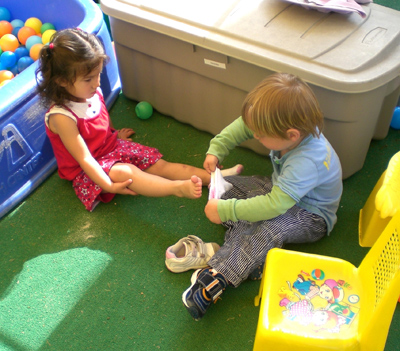I’ve been an officer in the Air Force, a church planter, a pastor and a husband. But for nothing have I felt more uncertain and unequipped than the honoured job-title of “dad”. I remember the day we brought our first-born, Nathan, home. The sobering weight of responsibility left me feeling out of my depth. Through the years that feeling of insufficiency has frequently surfaced. As a parent I realize my need for God’s help in wisdom, strength and love.
Two moments early in my parenting path portray my need for grace. When Nathan was just two weeks old he was hospitalised with an infection. He was really sick – dehydrated and weak. My wife Magriet spent the days with him and I spent the evenings. Our concern brought us to our knees in prayer – what else could we do? During that testing time I discovered the passion of a parent that connects deeply with God, the concerned Father. In my deep parental love and desperation, I discovered that this is the nature of our God: a Dad that would move mountains to heal a hurting child. In my prayers I identified with God’s passion and purpose, and God responded as he identified with my passionate plea. And we were both concerned over the same child, his son that he had entrusted to me, to us. God heard us and healed our son.
As every parent would know, fear is never far removed from the heart that loves deeply. The delightful path of parenthood is often littered with dread.
When Nathan was three it was such a season form us again. Our son was in trouble again and I felt utterly helpless. We watched as the bold, bubbly boy had grown increasingly reserved and unsure of himself, because he was unable to speak. We sought professional help, but the prognosis was not at all reassuring, and reading up about his condition in medical journals did not help at all. I recall several evenings waking up from nightmares in cold sweat because my troubled mind dreamed up scenarios where my speechless son would get lost in a mall, unable to say his name or who his parents are. Another time I woke up crying as I dreamed Nathan was being bullied at school and he could not tell me about it. These sleepless nights pushed me to raw prayers to our Concerned Father Whose heart I had discovered in that hospital room three years earlier. And He heard our prayers, and healed our boy once more.
Jesus came to reveal God as loving Father, redeeming the prodigals, healing homes. The Gospels retell how Jesus demonstrated God’s compassion for concerned parents. One such account is of Jairus,[i] the synagogue leader in Capernaum. This father foregoes of all protocol and prestige as he desperately knelt before Jesus on the crowded beach, pleading to come home and heal his 12-year old daughter. Amidst the public pressures and presumed needs surrounding Christ, Jesus eagerness to walk home with Jairus reveals God’s compassion for all troubled parents.

On the way home Jairus received the terrifying message “do not trouble the Teacher any more – your daughter is dead.” Yet Jesus insisted on still going to his home hopefully. Having moved all the mockers and mourners outside, Jesus brought both parents together inside with tree disciples, then took the little girl by the hand and restored her to life. Having given her to her parents, he asked them to keep this between them. In Christ’s mind this miracle was not meant to be for public propaganda – it was personal; God was moved by the pleas of a parent, and brought healing to their hurting home.
As a concerned parent I am encouraged by this account, as it shows God’s concern for my household. In fact, there are four accounts in the New Testament where Jesus responded to the cries of parents: Jairus, the synagogue leader (Luke 8:40-56); the widow of Nain with the demon-possessed girl (Luke 7:11-17); and the Canaanite woman whose son died (Matt. 15:22-28); the father of the epileptic man (Matt. 17:14-18). In these four accounts we have fathers and mothers, sons and a daughter, small children and adult sons; we have faithful Jewish parents and unbelieving (Canaanite) parents. But what all these stories have in common is that God responds to the pleas or cries of a concerned, grieving parent. God’s heart overflows with compassion for the broken-hearted parent. He knows what you feel.
There are four take encouragements from Jairus’ story that gives me confidence to parent through these tough times.
Firstly, I am encouraged to relentlessly “Trouble the Teacher” because I see here that God strongly identifies with the pain of a perplexed parent; that is why the Father sent His Son into the world. And although you may hear voices saying “don’t trouble the Teacher”, this Text says don’t stop – He will come!
Secondly, I see in the story that when Jesus comes, he not saves the child in trouble, but he heals the family. As Jesus enters the home he unites mom and dad who were grieving suffering separately. I have seen how the burden of a child in peril splits the parents. A crisis threatens to divide a family, but Christ comes to unite the family. Trouble the Teacher to come!
Thirdly, when Jesus enters he shuts the door to mourners and mockers and he restores peace. Parenting through tough times in our Google-generation brings dilapidating doubt; there is always another opinion or a new technique (with the subtle accusation that you’ve been doing it wrong – you’re the reason your child is still in trouble). Our world is a dangerous place for our children, and an even harsher place to their parents. Confusion and condemnation abound! But when Jesus enters, he closes the door to the critics and neigh sayers; he is the Prince that brings peace to the home.
Lastly, I notice Christ does not come alone – he brings his friends, his disciples. Any crisis, and especially a troubled child, tends to isolate a home. Loneliness and hopelessness are comfortable companions in crisis. But when Christ enters a home, he comes with his three most faith filled, compassionate companions. He not only banishes the faithless critics, but he fills the home with hopeful helpers. Jesus is among his friends; even the personal miracle is not a private matter. In the miracle, Jesus restores the home to a hopeful, healing community.
Dear parent, are you concerned about your child? Consider yourself in the greatest company, for God Himself is a concerned parent also. If your heart breaks for your child – regardless of his or her age – you are not alone – God’s heart is moved with compassion too. Jairus would encourage us to relentlessly “Trouble the Teacher” – He will enter your home, unite your family, banish unbelief, heal your child and restore you to community. After all, your child had always been his child, and your concern had always been his concern. Let him take your beloved by the hand and lead him / her to life again.

[i] Luke 8:40-56

















